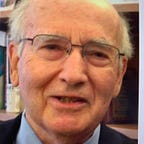Ideas for Improving Government and Saving Democracy. Six Broad Areas of Improvement
Philip Kotler
News headlines abound with the theme that American democracy isn’t working. Our states are described as red or blue. The red and blue sides won’t talk to each other or work together. Fewer than 60% of Americans vote in our major elections. Elected officials tend to get reelected repeatedly as a result of gerrymandering. Many Americans distrust voting outcomes, saying that the election was stolen. Much legislation is designed to satisfy special interests rather than the broad interests of citizens. Candidates get elected who are incompetent but manage to recruit enough moneyed donors. The amount of money spent on politics is out of control and cancel the idea of “one person, one vote”. The candidates who spend the most money typically win the elections. Winning candidates end up spending 20 percent of their time fundraising for the next election.
Just as we have built a high performing military, why can’t we build a high performing Congress. Right now, voters carry a very low opinion of Congress. Much government work is performed by government agencies. We need higher quality persons working in the federal government who are adequately paid.
We admit that democracy is even worse in other countries. Many former democracies — such as Hungary, Brazil, Philippines and Turkey — have been overtaken by autocrats. Had Donald Trump been reelected, our democracy would have succumbed to an autocratic leader. Autocratic leaders are a stark reminder of what can happen in America.
We need to improve the working of American democracy. In my book, Democracy in Decline (2016) (Sage), I describe fourteen shortcomings of American democracy (pp. 166–179). Here I have condensed them into six broad areas needing reform:
1. Improve the Citizen Voting Process. All citizens should feel free and motivated to vote on election days.
2. Improve the Quality of Candidates and Elected Officials. The political candidates and elected officials should be of high quality.
3. Improve the Power of the Big States in the Senate. States with small populations have too much weight in the Senate in relation to states with large populations.
4. Improve the Presidential Election Winning Process. Improve or eliminate the Electoral College.
5. Improve the Congressional Legislative Voting Process. Congress should vote with more speed on waiting legislation.
6. Improve the Supreme Court’s representativeness. The SC members are overly partisan and somewhat underrepresents the American public.
The challenge is to propose specific improvements in each of the six broad areas that will improve the functioning of American democracy. Here I list the main reforms needed in each of the broad areas.
1. Improve the Citizen Voting Process. All citizens should feel free and motivated to vote on election days.
· Change the Presidential election day to a weekend, not Tuesday.
· Allow voting by mail.
· Expand the hours of voting.
· Prepare enough voting locations so voters can vote quicker.
· Prevent voter suppression.
· Prevent gerrymandered districts that protect incumbents.
· Promote rank-order voting.
2. Improve the Quality of Candidates and Elected Officials. Political candidates and elected officials should be of high quality.
· Pass measures to limit the cost of campaigns and the time period of campaigns. Pass campaign finance legislation.
· Improve the primary or caucus voting system in selecting candidates
· Use rank order voting when several candidates are competing
· Set term limits for Congress members, such as 4 2-year terms for Representatives and two 6-year terms for Senators).
· Members of Congress who have a net worth of more than 100 million dollars should not receive compensation and not receive pensions after their term. They should participate in Social Security and Medicare as all citizens do and prepare their own retirement plan.
· Cut the number of House Representatives from 435 to 221 to save money and speed up decision making.
· Pass legislation to prevent gerrymandering.
3. Improve the Power of Big States in the Senate. States with small populations have too much weight in the Senate in relation to states with large populations.
· The big states should have (say) three Senators instead of only two Senators.
4. Improve the Election Winning Process. Improve or eliminate the Electoral College.
. Eliminate the winner-take-all votes system in the electoral college or eliminate the Electoral College.
· Pass a law to prevent out-of-state money in state elections.
5. Improve the Congressional Legislative Voting Process. Congress should vote with more speed on waiting legislation.
· Congress should prepare a timely budget each year.
· Eliminate the filibuster which gives too much power to a minority group to prevent legislation.
· Remove the power of the party chair to delay voting on key issues.
· Allow the President to have a line-item veto to remove fat from the legislation.
· Reduce lobbying activity. Pass a law to eliminate campaign contributions to candidates from businesses, unions or political action committees. Don’t allow ex-Congress people to become lobbyists for three years.
· 6. Improve the Supreme Court’s representativeness. The SC members are overly partisan and somewhat underrepresents the American public.
· Set 30 year term limit on Supreme Court justices.
· Develop an ethics code for Supreme Court Justices to prevent undue outside influence or extreme partisanship.
These six broad areas offer a starting point for more specific democratic reforms. Congress should appoint a Democracy Reform Committee. The Committee sets up six committees to consider the six areas of reform. Each committee gathers evidence, debates alternatives, and prepares specific proposals. The Democracy Reform Committee presents the different proposals to Congress for consideration and voting.
